|
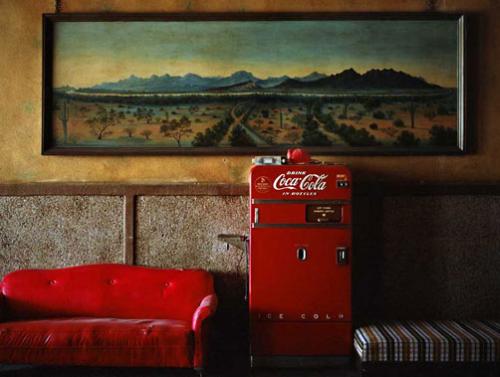
Lounge Painting # 1
Gila Bend, Arizona
Wim Wenders
b. Aug. 14, 1945
It took me hours to find somebody who could open up the lobby of the old "Stout's" hotel on Main Street in Gila Bend. It had been closed for years already. That painting over the Coke machine haunts me ever since. It's the dream version of the perfect beginning of a road movie.
_______________________
The Odyssey
Matthew Zapruder
Poem for a Friend
When people travel across the country they often call it the land
sometimes they carry polarizing filters for their cameras
these filters remove certain components of light
improving the contrast for instance of buildings and sky
and making everything look both more and less real
personally I would rather be walking but not too far
I love to live in the city living with someone who loves it too
we walk to small parks and drink coffee watching the tourists
I know I should feel pride when I think back on all the changes
later when we go to a bar I feel I am still somehow there
particle by particle you seem to be disappearing
when you talk to me about mountains I know
if you move any closer to them I will never see you again
everyone else does it too I mean living so why can't you
I've never seen anything as sad as that night you were singing to a large field
it was like you were glad there weren't any people in it
just a few spotlights and the weird way grass looks black at night
...(more)Floating Wolf Quarterly
Matthew Zapruder at the Poetry Foundation
12 or 20 questions: with Matthew Zapruder
rob mclennan
_______________________
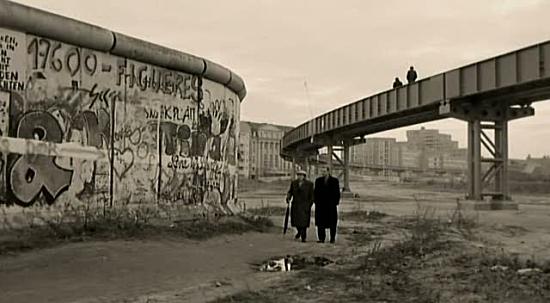
Wings of Desire
Wim Wenders
_______________________
This Is Not a Program
Tiqqun
Translated by Joshua David Jordan
ifile pdf
(....)Through arrogance, "international police" operations, and communiques declaring permanent victory, a world presented as the only world possible, as the crowning achievement of civilization, has finally been made thoroughly abominable. A world which believed it had completely insulated itself has discovered evil at its core, among its children. A world which celebrated a common new y ear as a change of millennium has begun to fear for its millennium. A world long settled in the house of catastrophe now warily grasps that the fall of the "socialist bloc" didn't portend its triumph but rather its own ineluctable collapse. A world gorged with the clamors of the end of history, the American century, and the failure of communism is now going to have to pay for its frivolity.(....)
... a definition of historical conflict us in which every existence in the pre-imperial period had its part: the class struggle. That definition no longer holds. It condemns us to paralysis, bad faith, and empty talk. No war can now be waged, no life lived, in this straightjacket from another age. To continue the struggle today, we will have to scrap the notion of class and with it the whole entourage of certified origins, reassuring sociologisms, identity prostheses. The notion of class is only good for holding like a little bedpan the neuroses, separation, and perpetual recrimination in which THEY have taken such morbid delight in France, in every segment of society, for such a long time. Historical conflict no longer opposes two massive molar heaps, two classes-the exploited and the exploiters, the dominant and dominated, managers and workersamong which, in each individual case, one could differentiate. The front line no longer cuts through the middle of society; it now runs through the middle of each of us, between what makes us a citizen, our predicates, and all the rest.
(....)
_______________________
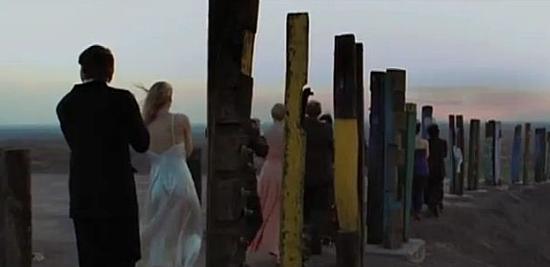
Pina
a tribute to Pina Bausch
Wim Wenders
youtube excerpts
via Vitro Nasu
_______________________
Canada
Matthew Zapruder
Canada
gets along with everyone
while I hang, a dark cloud
above the schoolyard. I know
we need war, all the skirmishes
to keep our borders where
we have placed them, all
the migration, all the difference.
(....)
I wonder how long I can endure.
In Canada the leaves are falling.
When they do each one rustles
maybe to the white tailed deer
of sadness, and it's clear
that whole country does not exist
to make me feel crappy
like a candelabra hanging
above the prison world,
condemned to freely glow.
 Christopher Richard Wynne Nevinson
b. August 13, 1889
_______________________
Central Europe as City: English language issue
eurozine
Res Publica Nowa (Poland) joins up with partners Host (Czech Republic), Magyar Lettre (Hungary) and Kritika + Kontext (Slovakia) for a collaborative English language issue on "Central Europe as City".
Coherent fragmentation
Finding and remembering in Central Europe's confused cities Levente Polyįk eurozine
(....)
2.
The glittering of fin de sičcle nostalgia, the aesthetic of ruin of the transforming urban landscape, and the ready-made decorative elements of the terrace all blend the divergent segments of Central European urban memory in a unique fashion. To this day, an imagined notion of adventure and spontaneity covers these recently still infamous parts of central Pest. This notion provides a perfect breeding ground for initiatives that connect dilapidation and an acceptable level of urban impoverishment with an enthusiastic irony regarding the remains of socialism, and make use of all these in the symbolic consumer domain of entertainment. Meanwhile, the giddy heights of a flat roof, as so often rediscovered by feature films, gives the terrace the big city tone into which urban dwellers are from time to time happy to dip. The desire for the unusual, for the architecturally ghostlike, is guaranteed by the reassuring proximity of fin de sičcle luxury, on which adventurers arriving from more prestigious districts can turn their backs.
This applies equally to those arriving from more prestigious countries. The Swedish jewellery designer, as he "tries out" the black and white photos he has bought in a second-hand shop against the raw, run-down wall of the house, is happy he is no longer surrounded by that desire for sterility that rid his home city of every little mark. The cracks in the walls, the peeling plaster... the jewels of the city, he says. ...(more)
_______________________
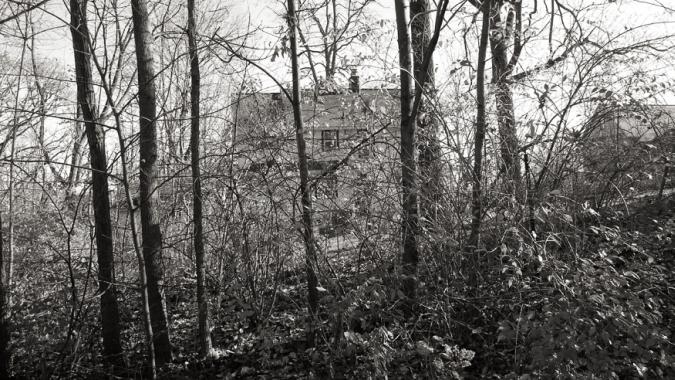
Forest
photographs and text
James Luckett
(....)these days i've a lot of time, unemployed and uncertain as ever, and it's the first time i've actually felt old, felt my age. enough anyway to know that there is a past, that there are things long gone. whole plazas exist now outside my reach. and there are things too that are mine only as much as i attend to them, equal only to what i can manage. ghosts require the best that we can do....(more)
LPV Magazinecontemporary documentary and fine art photography
more of James Luckett's photography available at consumptive
_______________________
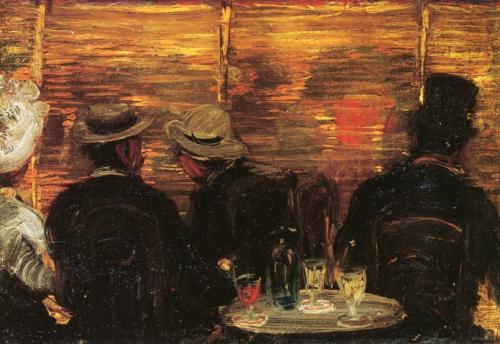
The Screen
Cafe de Versailles, Paris
George Luks
_______________________
There's nothing like fear and hatred to sharpen the senses. The riots have shown Britain some unpalatable truths about itself, making it impossible to hold on to a certain Whiggish story about social progress which, in the teeth of the evidence, we have persisted in telling about ourselves.
(....)
it's hard not to think we've made a culture in which the strong and swift are encouraged to feel they bear no responsibility towards the halt and lame. Now, as the wheels fall off the global financial system, fear and greed are free to roam unchecked, without bothering to mask their faces.(....)
The average Briton is a frightened, precarious and lonely little entrepreneur, jealous, not just of the banker living high on the hog, but of the "good immigrants", the Sikhs and Turks and Bengalis standing shoulder to shoulder outside their shops and mosques and gurdwaras, ready to repel attackers. Strapped for cash and stripped of organic community (leaving aside the question of whether that ever existed), we're left to clothe ourselves in the rags of class identity and class hatred. The poor hate the rich and the "feds" who enforce their laws. The rich hate the poor, who frighten them.
I suppose I shouldn't have been surprised to see a large number of supposed social liberals revealing their true colours on Monday night, tweeting and bleating for curfews and water cannon and rubber bullets. Early in the evening, watching social media, I was seeing variants of the same joke: "I'm in Chiswick/Hampstead/Dulwich Waitrose and there's a RIOT! They've run out of POLENTA!" The smug sense of disconnection (this is nothing to do with me, or my comfortable middle-class life – it is an affair of the poor, in places I choose not to go) was soon replaced by panic. "WHERE IS THE ARMY?" Screw civil liberties, time to declare martial law. How easy it would be to install fascism in this creaky little country! No need to torch the Reichstag – all you'd have to do would be to burn a few more sports shops.
- Hari Kunzru
_______________________
“We Would Rather Die in Our Dread”
Moving beyond the debt ceiling canard; much more is at stake
Phil Rockstroh
Dissident Voice
At present, most of us negotiate our days so distracted, disillusioned, dazed, buffeted, bought or marginalized by the corporate state/ mass media hologram — the multi-headed, awareness-addling Hydra that guards contemporary precincts of perception (apropos, the “debate” involving the so-called debt ceiling “crisis”) — it is difficult to apprehend what we are up against i.e., the forces of consolidated and calcified power that degrade almost every aspect of life in the nation.
In contrast, throughout this past year, popular uprisings of varying scope and degree of success have been unfolding worldwide. And the genie is not going back in the neoliberal bottle. The global power elite might not like it, but (unlike the general population of the U.S., whose view of life has been conditioned by the inundating, thus internalized, narcissism proffered by media age hyper-commercialism, and who have come to exist as self-involved consumer state dystopias of one) — large numbers of the people of the world are declaring to their overlords: We’ve had enough of the world you’ve created… time to make it our own.
With this in mind, let us take a moment to pity our own poor, little, economic despots — from the start, so misunderstood — they only built the U.S. on the bones of African slaves and watered the soil with the blood of murdered Indians, and, from that time on, proceeded to pile corpses to the sky, only so they could climb atop and look out for us lesser folks.
And from the soil rose a culture of kitsch, unhealthy food, and creepy, over-priced banal distractions. Consequently, the U.S. seems an over-priced, downscale theme Park — Six Flags over Denial and Decay — a grotesque, kitsch-bewitched land of negative enchantment, unprepared for the gathering, denial-sundering storm that, from all indications, will leave the nation devastated.
What are the forces and factors that have wrought this circumstance?...(more)
_______________________
 George Luks
b. August 13, 1867
_______________________
Language
The great paradox of the post-9/11 decade is that a traumatic event that should have made us all more aware of the world outside our borders has instead given birth to a curious insularity-an inward turn where the personal has once again become the political.
Marjorie Perloff
(....)
It is usual to blame the weak economy for such cutbacks. But the current insularity was in place before the economy went sour. Indeed, when we look back at the past 10 years, we will recognize it as the decade when America slept, mired in security concerns (Will I let the airport agent touch me?) and revenge (Which Al Qaeda leader is our target today?), its citizens so absorbed in personal issues that they ignored the plain reality that power was rapidly shifting elsewhere—not to the demonized Middle East, but to those new powers like China and South Korea and Brazil.
I just spent an amazing week in Rio de Janeiro, attending, among other events, the book launch for André Vallias's beautiful Portuguese edition of the poetry, correspondence, and essays of the great German Romantic poet Heinrich Heine—an event covered by the major Brazilian papers and TV. Brazil, a country now wholly energy-independent, exudes an enviable affluence, optimism, energy, and cultural dynamism.
Perhaps, now that a decade has gone by since 9/11, it is time for us once again to look outward. The increasingly tedious discourse of self-reflection—based on the assumption that we are the leaders of the "free world"—must give way to a more accurate sense of who and where we are in relation to the developing nations and cultures in our "global" backyard. Language study—not just of "foreign" languages but also of our own—will help us to deal with the reality that, as Wallace Stevens put it, "we are not / At the center of the diamond."...(more)
_______________________
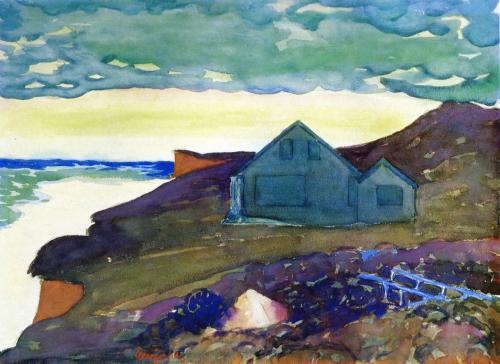
House on the Point
Christopher Richard Wynne Nevinson
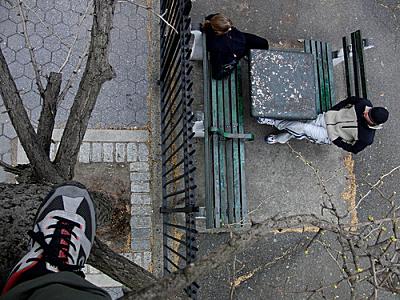
the Daily Climb
one full year of climbing a tree every day
Todd Smith Festival of Trees #62:
Lessons I Learned From a Tree
Festival of the Trees
_______________________
Esti
Excerpts from the Novel
Péter Esterhįzy
translated by Judith Sollosy
(....)
Esti is the shimmering twilight, the purple sunset, a happy hour, the fading light, he is a gentle breeze, a quiet chat, an amicable glass of wine, a silent prayer. Esti is a name that, though spoken for, teasingly asserts that it is waiting to be filled with content, that it is still (always this still!) indeterminate; be infinite! it says. Why don't you call me Kornél Esti?
But when Esti emerged from the intimacy of the Hungarian language that was powerless to protect him and introduced himself with a quick nod of the head that was humble yet self-assured, darf ich mich vorstellen, Kornél Esti, or at times clowning: Cornelius Esti, it meant nothing, there was nothing in Esti's place, not so much as a black hole. All told, this was not even Kornél Esti's gratifying life, the emptiness that contains the promise of the infinite, the infinite that frightens us with this emptiness.
Tree
Even as a little boy he could cry up a river, in earnest, without tears, like a man, and in the depths of his artless dismay, in the easy flow of his stormy tears, like a little girl. No one dared make fun of him, no cry-babying or fuss-potting; rather, they looked at him in alarm or drew away in disgust, as if to say, one shouldn't dirty the nest of one's own life. Or: don't go thinking only your life is special, we had dreams, too, but that's life, life is the poetry of the real, not the fantastical. Which is how they drew away in disgust or blinked in distress.
Esti was oblivious to all this. He embraced his father, his father's knee, because that was on a level with him. What's the matter, son? his father asked as affectionately as a father could. It's hard, it's so hard, daddy, Esti breathed into the knee. Now what am I supposed to say to that, his father thought, but so quietly that no one, not even himself, should hear. Can't you understand, I don't want anything, Esti sobbed, I don't want anything from life, except to climb a tree. And as soon as he said it, he'd aged. ...(more)
Hungarian Fiction Special Feature
Asymptote - July 2011
_______________________
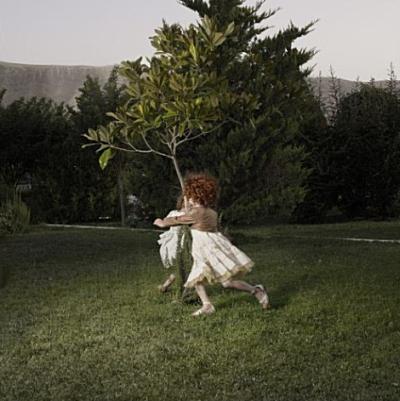
DreamCity, Waffa and Wasan
Dreamcity, Iraq
Anoek Steketee
via Joerg Colberg
_______________________
Austerity And Anarchy: [pdf]
Budget
Cuts And Social Unrest In
Europe, 1919-2009
Jacopo Ponticelli and Hans-Joachim Voth
abstract
Does fiscal consolidation lead to social unrest? From the end of the Weimar Republic in Germany in the 1930s to anti-government demonstrations in Greece in 2010-11, austerity has tended to go hand in hand with politically motivated violence and social instability. In this paper, we assemble cross-country evidence for the period 1919 to the present, and examine the extent to which societies become unstable after budget cuts. The results show a clear positive correlation between fiscal retrenchment and instability. We test if the relationship simply reflects economic downturns, and conclude that this is not the key factor. We also analyse interactions with various economic and political variables. While autocracies and democracies show a broadly similar responses to budget cuts, countries with more constraints on the executive are less likely to see unrest as a result of austerity measures. Growing media penetration does not lead to a stronger effect of cut-backs on the level of unrest. _______________________
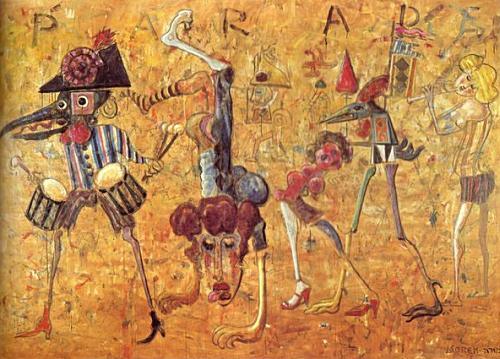
Parade
Mordecai MOREH
via
_______________________
Analysis of Financial Terrorism in America
Over 1 Million Deaths Annually, 62 Million People With Zero Net Worth, As the Economic Elite Make Off With $46 Trillion
David DeGraw
globalresearch
Abstract: Welcome to World War III
Despite increasing personal financial hardship, most Americans remain unaware of the economic world war currently unfolding. An all-pervasive corporate and government propaganda campaign has effectively obscured this blatant reality. After extensive analysis, it is evident that World War III is a war between the richest one-tenth of one percent of the global population and 99.9 percent of humanity. Or, as I have called it, The Economic Elite Vs. The People. This war has been a one-sided attack thus far. However, as we have seen throughout the world in recent months, the people are beginning to fight back. The following report is a statistical analysis of the systemic economic attacks against the American people.
_______________________
The History of Torture—Why We Can't Give It Up
Colin Woodard
Torture by military forces was thought a thing of the past. Indeed, the American historian John Fiske in 1889 declared it almost "as extinct as cannibalism."
Then it came roaring back. _______________________
The Uncollected Poems of Alberto Caeiro
Fernando Pessoa
translated fby Michael Lee Rattigan
(....)
From afar I see a ship go by...
Drift indifferently down the river Tagus.
Indifferent not for paying me no attention,
I don't feel distressed by that...
It's indifferent because it has no sense at all
Outside of the simple nautical fact
Of its going downriver with no reference to anything beyond that...
Downriver toward the reality of the sea.
...(more)
Asymptote
international journal dedicated to literary translation
_______________________
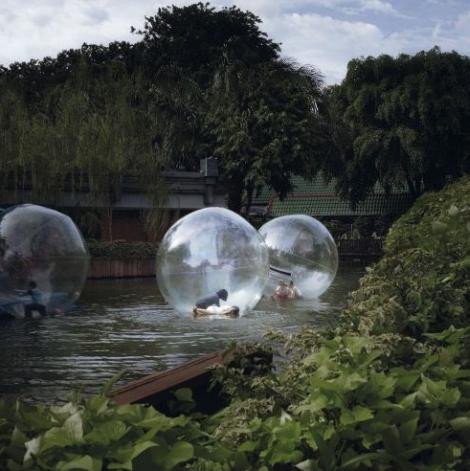
DreamCity, Balloons
Dunya Fantasia, Indonesia
Anoek Steketee
_______________________
El cutis patrio
Excerpts
Eduardo Espina
ranslated by Daniel Borzutzky
Asymptote
(....)
The Fog Discusses the Horse
(The incommensurable always wants to win)
The notion of the alazan cures with a soft star.
For the past year part of a breed against
the hill wants for its shoe to bring luck.
Long ride, nomenclatured babbling.
In another era nicknames and few words,
the mane for the established cowboy.
Prosody disposed to endure, its illusion of existing,
I move the manure nearer to the frail plain,
that cadence of the unequal leaps.
From the silence the neighing is released from the danger,
useful bad habits were made to leave through the umbilical
limbo to liquidate captive its afflictions
and in some of these to be born when it will be.
In Byzantium they sensed a century of syntax,
plucked out spurs that came to stay.
...(more)
_______________________
The Lost Art of Postcard Writing
Charles Simic
(....)
Unlike letter writing, there never has been, and there never could be, an anthology of the best of postcard writing, because when people collect postcards, it’s usually for reasons other than their literary qualities. If there was such a book, I’m sure it would contain hundreds of anonymous masterpieces of this minimalist art, since unlike letters, cards require a verbal concision that can rise to high level of eloquence: brief and heart-breaking glimpses into someone’s existence, in addition to countless amusing and well-told anecdotes. Now and then one encounters in antique shops and used book stores boxes full of old postcards valued for their antiquity, their images and their stamps. The writing found on them most often tends to be in faded ink and hard to read. To anyone with plenty of time on their hands, I recommend reading a bunch of them. Postcards continued to be used by people of modest means to convey important family news long after telephones ceased to be a novelty....(more)
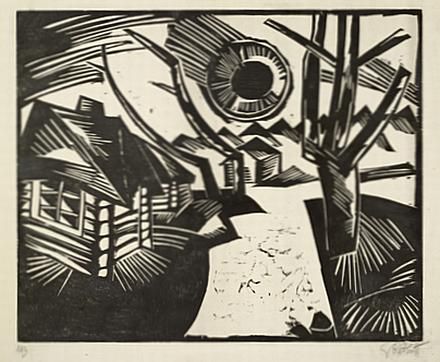
Russian Landscape with Sun
1919
Karl Schmidt-Rottluff
d. Aug. 10, 1976
_______________________
Theses On The Terrible Community
Tiqqun
5. Those That Remain, Those That Depart
1
One enters the terrible community because anyone who goes looking in the desert finds nothing else. One traverses the rickety and provisional human architecture. At first one falls in love. And upon first entering it one feels that it was built with tears and suffering, and that it needs still more in order to go on existing, but that doesn’t matter much. The terrible community is above all a space of self-sacrifice, and that’s disturbing; it awakens the “reflex of concern.”
2
But relationships within the terrible community are all worn out; they’re not so young anymore (alas!) when we arrive. Like the pebbles in the bed of a fast-flowing creek, the gazes, gestures, and attention have already been eroded, consumed. Something’s tragically amiss in life within the terrible community, since indulgence doesn’t have any place in it anymore, and friendship, so often betrayed, is only granted with an oppressive stinginess.
Whether we like it or not, those who pass through, those who enter in, pay for the misdeeds of others. And those they’d like to love are already quite visibly too damaged to give an ear to their good intentions.
“It will pass in time…” And so the mistrust of others has to be defeated, and more precisely, one must learn to be mistrustful like the others in order that the terrible community might yet open up its emaciated arms. And it is by one’s capacity to be hard on the new initiates that one demonstrates one’s solidarity with the terrible community....(more)
_______________________
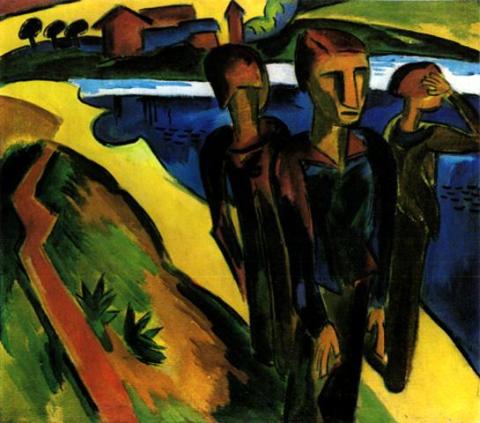
Karl Schmidt-Rottluff
_______________________
the terrible community of financial capitalism
tobias c. van Veen
(....)
The financial community crossed over into illegality. Hell, it bought and sold the legal system. It understands full well every ounce of Tiqqun’s phrase that “all sado-masochistic exchanges outside of commodity relations are devoted in the end to illegality.” Indeed, the financial community long exceeded the mere trading of goods, or even that commodity relations – whether it be that of the signifier itself, of money, or of bodies, or of resources, products, processes or objects in general – should determine the basis of trade negotiations, future assessments, currencies, stock prices or debt obligations. The financial community reified, beyond the paradigm of legality, the profiteering of sado-masochistic force itself. When buying and selling against the probable failure of toxic assets, in such a way that utterly erases all ties to any kind of commodity relation, then the financial community trades in nothing but sado-masochistic violence wrought through the power of mystic numerosity. Credit and debit are concepts applied through the distribution of financial “justice” – the simple equation where debt is judgement, bankruptcy, death. The financial community disregards with sheer contempt the consequences of capitalizing the very human relations outside of commodity relations – where thousands of Blooms would be forced to foreclose and enter into bankruptcy – and their sacrifice is to workship the most pure, abstract illegality, the unleashed violence of abstract Moloch. Or so it thinks....(more)
_______________________
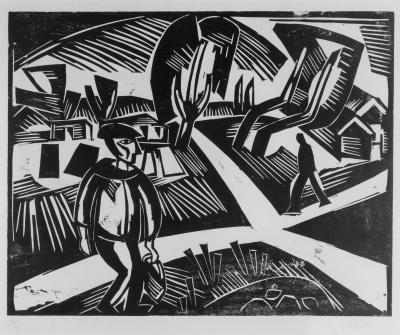
Russian Landscape with Crossing Roads
Karl Schmidt-Rottluff
1919
_______________________
On Turning Poverty into an American Crime
Nickel and Dimed (2011 Version)
Barbara Ehrenreich
Media attention has focused, understandably enough, on the “nouveau poor” -- formerly middle and even upper-middle class people who lost their jobs, their homes, and/or their investments in the financial crisis of 2008 and the economic downturn that followed it, but the brunt of the recession has been borne by the blue-collar working class, which had already been sliding downwards since de-industrialization began in the 1980s.
_______________________
The Geography of Injustice
Danny Dorling
(Part 1)
(....)
Wealth creators – the phrase is a joke. Even if you were working mining gold and you personally had found the best seam in Wales, say, you couldn’t actually mine £60 million worth in a year. This thing about working hard – the hypocrisy of the phrase! I’m getting paid now talking to you. Is this hard work? I talk to bankers and they are sitting in nice chairs having a nicer time than me. Someone working in a normal job would look at this and laugh when you call it hard work. I’m well within the top 5% of the richest people in Britain. So I’m up there too, I’m part of the problem. But I don’t think this creates a world that’s necessarily any good for me and I don’t even think it creates a wonderful world for the rich. Having a bit of money is nice. Being able to heat your house is nice. To have one or two holidays a year is nice. But there are massive diminishing returns after that as to how much you enjoy your third, fourth or sixth holiday a year.(....)
I get in so much trouble when I talk about the problems of the rich but it is worth concentrating on the rich because they are so much more powerful than the poor. So I can see the point of saying to people who are relatively wealthy that if the people above you could come down towards you, so they have less and you’re willing to give up a little, not as much as them, but little more than the people below you, then we’d all be in a slightly less frightening environment. It means that if one of your children doesn’t do too well in the future it doesn’t matter that much, they won’t join another species.
Currently when you’ve got wealth gaps of 270 times, that means that if you’re in the top 10% of wealth in London and your child enters the bottom 10% then they become another kind of animal. Ever so rarely, but occasionally, someone marries someone from the wrong side of the tracks. And the social embarrassment! I mean for a start your two families may both speak English but they won’t be able to understand the words. We’re back to Pygmalion levels of differences in accents....(more)
(Part 2)
_______________________
Michele Bachmann Was Inspired By My Dad and His Christian Reconstructionist Friends -- Here's Why That's Terrifying
Frank Schaeffer
_______________________
A Grammar of the Multitude
For an Analysis of Contemporary Forms of Life
Paulo Virno
Translated by Isabella Bertoletti, James Cascaito and Andrea Casson
SEMIOTEXT(E)
_______________________

Karl Schmidt-Rottluff
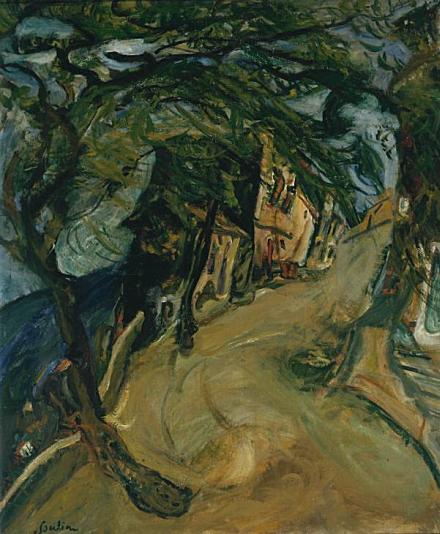
The Road up the Hill
c. 1924
Chaļm Soutine
d. August 9, 1943
_______________________
Again the Roads are Silent
Tomaz Salamun
Translation by Christopher Merrill and Toma˛ alamun
again the roads are silent, dark peace
again there are bees, honey, silent green fields
willows by the rivers, stones at the bottom of the valleys
hills in the eyes, sleep in the animals
again the children are restless, blood in the whistles
again there is bronze in the bells, an aura in the tongue
travelers greet one another, the plague strengthened the joints
wild deer are in the palm, the snow shines
I see the morning, how I hurry
I see skin in the pious dust
I see shrieks of joy, how we head toward the south
Toledo man, two little hitchhikers
the images are clear, the flowers are timid
dark sealed sky, I hear a scream
the time for love awaits, time of tall statues
silent clear hinds, dreamy linden trees
Tomaz Salamun at Poetry International Web and the Poetry Foundation
_______________________

photo - mw
_______________________
The Persistence of Ectoplasm
Michael Rothenberg
Let me touch you there blue warbler
Something to beware of coming under-wing
That cage and mirror, cuttlebone maze
Fast approaching end of free days
I heard the hole in the ground, slit drum sing:
“Where is the real bird, real song, the real?”
In the mirror reading each line backwards
I thought I thought I was never afraid, or blush
Hunters come to lock the day in a library
Ink-stained thumbs, permission clipped tongue
Peace be with you naked in razorwire thornbush
Transcendent in being, let it rain, but if it die
The blood orange, strawberry stain
If not for that I’d be ashamed of speech
What’s your name darling? Verse! Peach
Outcome of fleshlight falling midnight moon
Written in sand, hand-written, tidal wave
Remains tattooed to memory, a wind birth
Archipelago
Michael Rothenberg
Electronic Poetry Center _______________________
If one of the translator's dreams is to propose to those who are unilingual access to the vast wealth of the world's shelves, then in order to facilitate this metempsychosis, the always penultimate version shall entertain the thought of resuscitation in keeping with the ambivalences of new markings.
On Harmony
A Theory of Translation
Serge Gavronsky drunken boat
We have been told over and over again at conferences, in articles and works of erudition that translation and treason are commercial twins in Respublicitatis. No wonder this etymological twinning has succeeded in boring us to death, especially for those of us who have listened attentively to the perpetual recuperation of the layers of the past in language. What I say is not meant to encourage another burning of the library at Alexandria; rather, it is to allow words, as they are now taken, as Saussure had it in his DADA days in Geneva, to be expressive of thought and the accompanying music of phonemes.
The function of metaphor here becomes acutely significant: the "betrayal" of the translator, once thought to be negative, has, in an odd Engelian twist, taken on positive values. It appears that betrayal is a game we play as translators as if the semantics of it all did not contain what literature itself as well as commerce and espionage have denied us all along. Thus in a Régis Debray’s mediological perspective, one could say that Calvin Klein betrayed the canonic rules of advertisement when he so indelicately portrayed a group of decadent adolescents on the sides of Broadway buses. Or that, in the Song of Roland, Ganelon had not been properly rewarded for his deed; or again, that a certain Mr. Ames, working for the CIA, but also for the Soviets, had not, imperatively, sacrificed the lives of innumerable agents by doubling his income. The results of doubling one’s duties and affections lead directly to one of the select circles in Hell.
Let me go back historically to the beginning of the beginning to see to what extent this play with metaphor leads to a contemporary reflection on textuality and its specificity, or, in fact, irreducibility: "Yes, Virginia, the ‘original does indeed exist!" ...(more)
Three On TranslationSerge Gavronsky drunkenboat
_______________________

photo - mw
_______________________
Colombia
Tomaz Salamun
translated from the Slovenian by Brian Henry
Cats have set themselves on wings.
Buttons have buttercups. Hares are soft meat,
hares are soft meat, they quiver and throng.
They rise the sun, actually hold it
on little poles planted in the sand.
Water fortifies the poles in river sand. A pool
vibrates differently from clay. It spills itself
and does not come back rhythmically. The sea
is a guarantee and the nosy are full of adrenaline.
And now? How are you? Is there also a membrane
in the volcano along which the tongue glides?
That which stirs the cells of memory
and undulates the body and screams
when the sun soaks, soaks, roasting in Ika?
Six Poems
Tomaz Salamun
translations by Brian Henry
blackbird
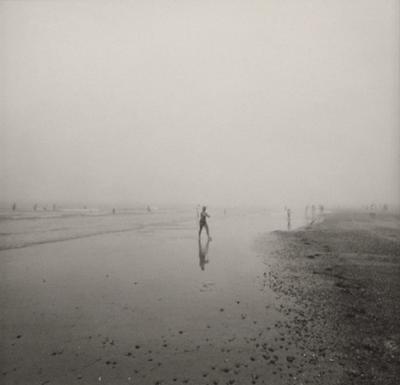
Cape Cod
Harry Callahan
1972
At The Water's Edge
Robert Mann Galleryvia
_______________________
YAWP
Richard Hoffman
Walt, under my bootsoles you smell like napthalene and paint
whenever the water table rises, and no one is held accountable.
Generalists with cell phones selling wellness products on the
beltways of America at eighty miles per hour believe
they are the first to ever want a life that’s more than labor and
have made that aspiration a creed. Their prayer: May I get mine.
...(more)
_______________________
 Gardening
1960-63
Howard Hodgkin
1 2
_______________________
Seven Stories from the Palace of Rubble
Kyra Simone
conjunctions
When Language Is Gone From Bodies
On the radio, a man tells the story of a mythical rabbit, who was beaten so badly, he split in two and became twins. The sailor tilts in his chair and listens to the legend, touching the patterns of animals he has killed and tattooed across his chest. His hands are graveled from wrestling anacondas. His boat sails through sunken rings of fog, passing lost thoughts of the pinching collar, or eyes transfixed by the watch on the wrist, and the shrinking of the spirit that can result. Long-gone relatives take off their corsets in the distance, realizing that the shadows of electrical wires are the same as winter branches that have let their leaves fall. The sailor’s table is set with a feast; the nightingale waits to land upon his shoulder. “Here we are truly in another world,” he says, collecting the feathers of his winged companion. “And look, I can still make a blanket of your anxiety.” The sailor picks up a postcard, each day left blank. His mind is swimming with fish, moving blindly toward a green light. The world is full of magnificent things. Ravishing dancers linger in costume, dinosaur skeletons emerge from boys’ heads, meadows lie punctuated with discarded glass. Oh to wander light-headed, through a gallery of faces, and be blown untraceably from one island to the next. There are many kinds of time that exist: the long, slow, repetitive cycle and the fleeting moments of bodily motion. One day, he may dock his boat in a desolate cove known for rare whales, and find no creatures. Instead, a rare woman will come out to greet him, a goddess among a forgotten population of five.
...(more)
_______________________
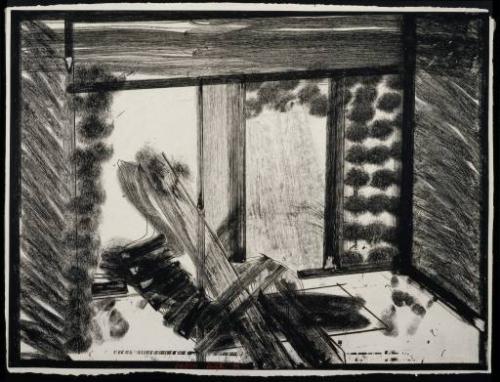
Thinking Aloud in the Museum of Art
Howard Hodgkin
1979
_______________________
The Work Of Memory:
New Directions In The Study Of German Society And Culture
Alon Confino, Peter Fritzsche
google books
from
Dangerous Memories
Epilogue to The Work of Memory
Steven T. Ostovich
Walter Benjamin's understanding of memory is bound up with his philosophy of language and history and his theology, but it is based on an experience he characterizes as the "chaos of memories." There is a resistance to narrative ordering and control associated with memory for Benjamin. He specifies this resistance further: "I find in my memory rigidly fixed words, expressions, verses that, like a malleable mass which has later cooled and hardened, preserve in me the imprint of the collision between a larger collective and myself" in which "isolated words have remained in place as marks of catastrophic encounters." Catastrophe engenders memories whose rough and hardened edges preclude placement in smooth-flowing narratives as a form of coming to terms with the past. These memories are disturbing in a manner similar to dreams. Like dreams, these memories involve crossing a threshold and stepping outside the closed world of normalcy. They "arrest" thought: "Thinking involves not only the flow of thoughts, but their arrest as well. Where thinking suddenly stops in a configuration pregnant with tensions, it gives that configuration a shock, by which it crystallizes into a monad." The political theologian Johann Baptist Metz, under the influence of Benjamin, describes these memories as follows:
There are memories in which earlier experiences break through the centre-point of our lives and reveal new and dangerous insights for our present. They illuminate for a few moments and with a harsh steady light the questionable nature of things we have apparently come to terms with, and show up the banality of our supposed "realism." They break through the canon of all that is taken as self-evident, and unmask as deception the certainty of those "whose hour is always there" (John 7.6). They seem to subvert our structures of plausibility. Such memories are like dangerous and incalculable visitants from the past.
These memories are dangerous in their threat to attempts to master the past through constructing historical narratives.
History in the context of dangerous memories is catastrophe. "The concept of progress should be grounded in the idea of catastrophe. That things 'just keep on going' is the catastrophe." The now classic image for this catastrophic understanding of history in Benjamin is the ninth of his Theses on the Philosophy of History: "A Klee painting named 'Angelus Novus' shows an angel looking as though he is about to move away from something he is fixedly contemplating. His eyes are staring, his mouth is open, his wings are spread. This is how one pictures the angel of history. His face is turned toward the past. Where we perceive a chain of events, he sees one single catastrophe which keeps piling wreckage upon wreckage at his feet." The dream-image of history appears to be a nightmare. In this context, the role of memory is to provide the awakening shock. _______________________
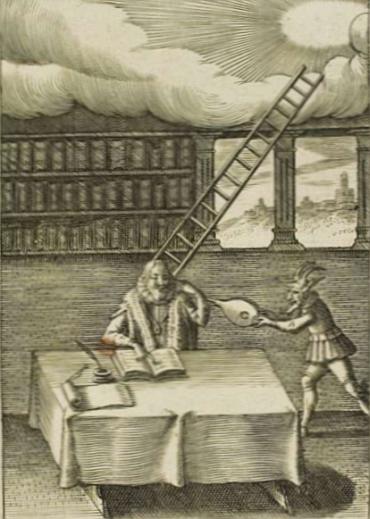
Emblemata Nova
Andreas Friedrich
1617
via BibliOdyssey
_______________________
Truman Lied, Hundreds of Thousands Died
David Swanson
dissident voice
When Truman lied to America that Hiroshima was a military base rather than a city full of civilians, people no doubt wanted to believe him. Who would want the shame of belonging to the nation that commits a whole new kind of atrocity? (Will naming lower Manhattan “ground zero” erase the guilt?) And when we learned the truth, we wanted and still want desperately to believe that war is peace, that violence is salvation, that our government dropped nuclear bombs in order to save lives, or at least to save American lives.
We tell each other that the bombs shortened the war and saved more lives than the some 200,000 they took away. And yet, weeks before the first bomb was dropped, on July 13, 1945, Japan sent a telegram to the Soviet Union expressing its desire to surrender and end the war. The United States had broken Japan’s codes and read the telegram. Truman referred in his diary to “the telegram from Jap Emperor asking for peace.” Truman had been informed through Swiss and Portuguese channels of Japanese peace overtures as early as three months before Hiroshima. Japan objected only to surrendering unconditionally and giving up its emperor, but the United States insisted on those terms until after the bombs fell, at which point it allowed Japan to keep its emperor.
(....)
Combating evil is what peace activists do. It is not what wars do. And it is not, at least not obviously, what motivates the masters of war, those who plan the wars and bring them into being. But it is tempting to think so. It is very noble to make brave sacrifices, even the ultimate sacrifice of one’s life, in order to end evil. It is perhaps even noble to use other people’s children to vicariously put an end to evil, which is all that most war supporters do. It is righteous to become part of something bigger than oneself. It can be thrilling to revel in patriotism. It can be momentarily pleasurable I’m sure, if less righteous and noble, to indulge in hatred, racism, and other group prejudices. It’s nice to imagine that your group is superior to someone else’s. And the patriotism, racism, and other isms that divide you from the enemy can thrillingly unite you, for once, with all of your neighbors and compatriots across the now meaningless boundaries that usually hold sway.
If you are frustrated and angry, if you long to feel important, powerful, and dominating, if you crave the license to lash out in revenge either verbally or physically, you may cheer for a government that announces a vacation from morality and open permission to hate and to kill. You’ll notice that the most enthusiastic war supporters sometimes want nonviolent war opponents killed and tortured along with the vicious and dreaded enemy; the hatred is far more important than its object. If your religious beliefs tell you that war is good, then you’ve really gone big time. Now you’re part of God’s plan. You’ll live after death, and perhaps we’ll all be better off if you bring on the death of us all.
But simplistic beliefs in good and evil don’t match up well with the real world, no matter how many people share them unquestioningly. They do not make you a master of the universe. On the contrary, they place control of your fate in the hands of people cynically manipulating you with war lies.
And the hatred and bigotry don’t provide lasting satisfaction, but instead breed bitter resentment....(more)
_______________________
Bosnia, Kosovo, and Now Libya: The Human Costs of Washington’s On-Going Collusion with Terrorists
Peter Dale Scott,
The pattern of U.S. collaboration with Muslim fundamentalists against more secular enemies is not new. It dates back to at least 1953, when the CIA recruited right-wing mullahs to overthrow Prime Minister Mossadeq in Iran, and also began to cooperate with the Sunni Muslim Brotherhood.3 But in Libya in 2011 we see a more complex marriage of convenience between US and al-Qaeda elements: one which repeats a pattern seen in Bosnia in 1992-95, and Kosovo in 1997-98. In those countries America responded to a local conflict in the name of a humanitarian intervention to restrain the side committing atrocities. But in all three cases both sides committed atrocities, and American intervention in fact favored the side allied with al-Qaeda.
The cause of intervention was fostered in all three cases by blatant manipulation and falsification of the facts....(more)
_______________________
War Is Heller
Why there are no more Joseph Hellers.
Walter Kirn
slate
Heller's island airbase of freaked-out aviators oppressed by cuckoo officers is the ding-a-ling civilian world in microcosm, not an infernal, tragic realm apart. The men who can feel aren't agonized, they're addled. The ones who can't feel (and therefore give the orders) are permanently, structurally annoyed. The naked and the dead are here but invisible to the beribboned and the daft.
_______________________
8 Reasons Young Americans Don't Fight Back:
How the US Crushed Youth Resistance
Bruce E. Levine
_______________________
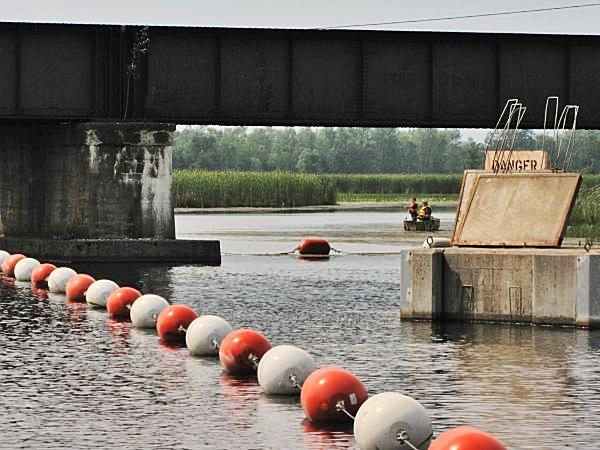
photo - mw
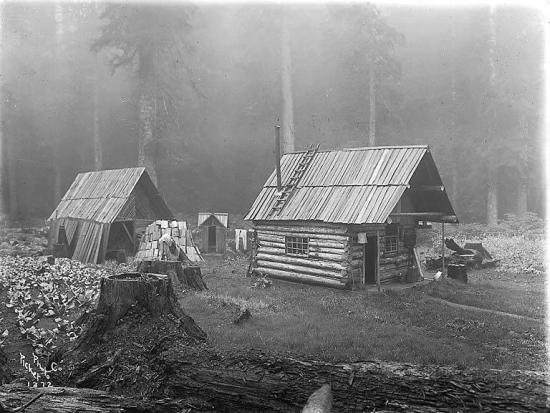
Snohomish County
ca. 1911
Lee Pickett
_______________________
What is code? A conversation with Deleuze, Guattari and code*
David M. Berry & Jo Pawlik
Kritikos
Volume 2, December 2005
(....)
JP: The hacker stands starkly here. If code can be hacked, then perhaps we should drop a monkey-wrench in the machine, or sugar in the petrol tank of code? Can the philosopher be a model for the hacker or the hacker for the philosopher? Or perhaps the hacker, with the concentrations on the smooth, efficient hacks, might not be the best model. Perhaps the cracker is a better model for the philosophy of the future. Submerged, unpredictable and radically decentred. Outlaw and outlawed.
DB: Perhaps. But then perhaps we must also be careful of the fictions that we both read and write. And keep the radical potentialities of code and philosophy free.
Wet with fever and fatigue we can now look toward the shore and say goodbye to where the windows shone so brightly....(more)
Kritikos: an international and interdisciplinary journal of
postmodern cultural sound, text and image
_______________________

Cordite's special thirty-fifth issue, showcases new poetry from Australia (OZ) and the Republic of Korea (KO). Over the next three months, this site will play host to a range of new works including poetry in English and Hangul, critical essays, feature articles, interviews, photo essays and blog posts from a total of over seventy contemporary poets and writers.
Four poems by Gi Hyeongdo
English translation by Gabriel Sylvian
Old Book
Gi Hyeongdo
English translation by Gabriel Sylvian
It’s close to a miracle
that I’ve lived
I was moldy for what seemed an eternity
How can I predict my own life
in a damp dark world
in an order where no one bothers to look at me,
in empty hope?
Other people hurriedly take a few contents
and coveting one another’s functions
insert their bookmarks into me
Others say my life has been too easy
that I need thicker memories
Is thickness truly a problem when perfection is your goal?
I’ve moved several times, lived in different places,
but never paid a thought to death. My career
lies only in my birth. Why?
Because fear is a part of me
and because the future is my past
The fact that I exist, so
see there, what an irresponsible thing courage
Every person who ever looked at me once
left me, my soul
is mostly dark pages, who will ever open me?
But in that case they have no right to discourse on lies
Lies and truth must dream the same objective
and they can be found in the exact same line
I don’t believe in miracles
...(more)
_______________________
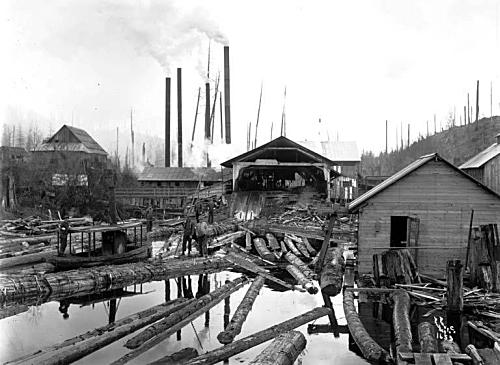
Snohomish County
ca. 1913
Lee Pickett
_______________________
Origins of the Crisis
Stephen Squibb
(....)
While the situation in Greece is simply the sort of good old-fashioned sovereign debt crisis that the developed world regularly inflicts on its periphery for fun and profit, what is emerging in the US is a much more serious question of hegemony.
(....)
Today, attacks organized by fundamentalist thugs against their conservative patrons no longer seem so exceptional. The Tea Party has been mocked for its nostalgia for a former America of great freedom and opportunity, but from a solely economic perspective, their diagnosis is not incorrect: the country memorialized endlessly on talk radio, Fox News, and in the steady stream of high-gloss World War II moral pornography—that is, the US before neoliberalism—really was a more equitably prosperous nation, especially, as it happens, for white people. Having fostered a burning desire for the world they helped destroy, the neoconservative patrons of the Tea Party now face blowback of their own. The Tea Party Caucus really believes that government, as such, is the problem, rather than understanding such extremism as a rhetorical position necessary to keep the money moving upwards. ...(more)
via adswithoutproducts
_______________________
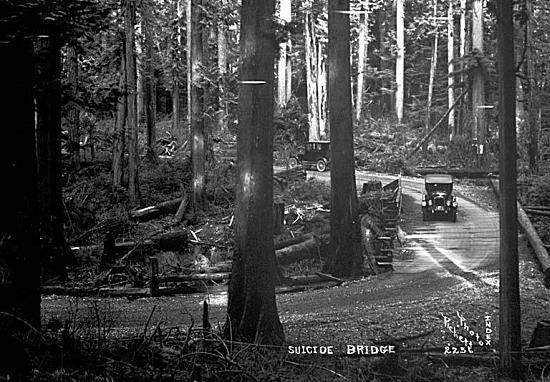 Lee Pickett

My Summer Studio
c.1900
John Twachtman
(August 4, 1853 – August 8, 1902)
_______________________
from Mesongs
Kamau Brathwaite
XXIV
for Barbara at Devizes
And suddenly you was talking trees
fall black with birds behind the hill
and green as grass fly off
into the sun o blinding girl
the whole cathedral crash at your back
XXV
Not the blue the orthodoxy of the day
But a blue like intuition
The soft of the night into morning
Felt here . remembered
Under the hoofs of the cart
To return the margin to the centerMatthias Regan on Kamau Brathwaite and Elleguasjacket2
This is an essay in guise of a review. The book in question, Kamau Brathwaite’s Elegguas, recently published as part of Wesleyan University Press’s “Driftless Series” (a new program funded by the Beatrice Fox Auerback Foundation), is highly recommended. But my argument encompasses more than this volume supports. In fact, it’s the inadequacy of this book to represent Brathwaite’s contributions to our culture that worries me. As Brathwaite, who is in his eighties, prepares to leave this world, I hope that his legacy will be given the attention it deserves. Books like Elegguas (approximately Brathwaite’s fortieth publication) may help the next generation of writers to appreciate his work, but risk framing the writer as an “experimental” poet, one who embraces the margins of cultural life, rather than as a populist and innovator of writing in English who I believe should be regarded as one of the greatest poets of the language in the second half of the twentieth century. Brathwaite deserves such a title, and I expect that internationally, and for decades to come, he will be regarded as the postwar equivalent to English-language modernists like Yeats, Hughes, Stein, or Williams: as a innovator of new forms of democracy in verse. Brathwaite’s postcolonial poetics represent a transformation in the practice of poetry as significant as those associated with these one-time “experimenters,” and like each of these poets, he produced new forms by insisting that poetry must create a public among ordinary people. Like these writers, he may appear to us as part of an “avant-garde” or, as this recent book suggests, as a poet who has developed a highly personalized style. This mistakes the true gravity of Brathwaite’s accomplishment, which is to produce a poetics of the “multitude”: a form of poetry that responds simply, boldly, and effectively to the forces of Empire which shape the world today. In short, Brathwaite is the first poet in English to create an adequate aesthetic response to globalization.
...(more)
Kamau Brathwaite at the Poetry Foundation and PennSound
Middle Passages
Kamau Brathwaite
google books
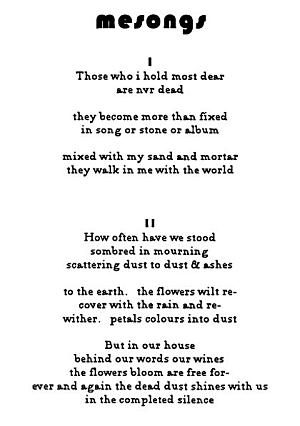
Elegguas
Kamau Brathwaite
google books
_______________________

Afternoon Shadows
John Twachtman
c. 1890-1900
_______________________
Space, Cyberspace and Interface:
The Trouble with Google Maps
Timothy Erik Strom
Pick a printed or manuscript map from the draw almost at random [or visit Google Maps] and what stands out is the unfailing way its text is as much a commentary on the social structure of a particular nation or place as it is on its topography. The map-maker is often as busy recording the contours of feudalism, the shape of a religious hierarchy, or the steps in the tiers of social class, as the topography of the physical and human landscape.
Maps are cultural artefacts that are deeply implicated in the history of ideas; intrinsically linked to our conceptualisations of space; and inform our political and personal subjectivities (Harley, Wood). Throughout human history the role of maps has changed in a dialectic relationship with developments in science, technology, economics and military concerns, all within a shifting socio-political landscape and its philosophic underpinning. They can be viewed as an interface of the problematic divide between nature and culture.
Drawing from the critical cartography of J.B. Harley, this essay will examine the popular and influential online Geographic Information System (GIS), Google Maps (Gmaps): a powerful, centralised, interactive, online world map and one arm of Google’s digital empire. Gmaps is simultaneously a cultural product and producer that conveys, configures, and communicates space as a mental/materialist construct. This construct is inseparable from cultural concepts of space, place, ideas, loyalties, senses of belonging, imagined communities and globalisation....(more)
M/C Volume 14 Issue 3 June 2011 'trouble'_______________________
Film-Philosophy Vol 15, No 1 (2011)
Phenomenology and Psychoanalysis
Edited by David Sorfa
The Return of the New Flesh:
Body Memory in David Cronenberg and Merleau-Ponty
Dylan Trigg
Abstract
From the “psychoplasmic” offspring in The Brood (1979) to the tattooed encodings in Eastern Promises (2007), David Cronenberg presents a compelling vision of embodiment, which challenges traditional accounts of personal identity and obliges us to ask how human beings persist through different times, places, and bodily states while retaining their sameness. Traditionally, the response to this question has emphasised the importance of cognitive memory in securing the continuity of consciousness. But what has been underplayed in this debate is the question of how the body can both reinforce and disrupt the grounds for our personal identity. Accordingly, by turning the notoriously “body conscious” work of Cronenberg, especially his seminal The Fly (1986), I intend to pursue the relation between identity and embodiment in the following way.
First, by augmenting John Locke’s account of personal identity with a specific appeal to the body, I will explore how Cronenberg’s treatment of embodiment as a site of independent experience challenges the idea we have that cognitive memory is the guarantor of personal identity. Cronenberg’s treatment of the “New Flesh” posits an account of the body that undermines the Cartesian and Lockean account of personal identity as being centred on the mind. In its place, I will argue that Cronenberg shows us how the body establishes a personality independently of the mind.
Second, through focusing explicitly on body memory, I will explore how we, as embodied subjects, relate to our bodies in a Cronenbergian world. Approaching this relation between memory and embodiment via the phenomenology of Merleau-Ponty, I will argue that memory is at the heart of Cronenberg’s vision of body horror. I will conclude by suggesting that far from generating unity, Cronenberg’s vision of embodiment and identity is diseased (often literally) by a memory that cannot be assimilated by cognition. The result of this failure to assimilate body memory, is that memory itself occupies the role of the monster within.
Dylan Trigg blogs at Side Effects
_______________________
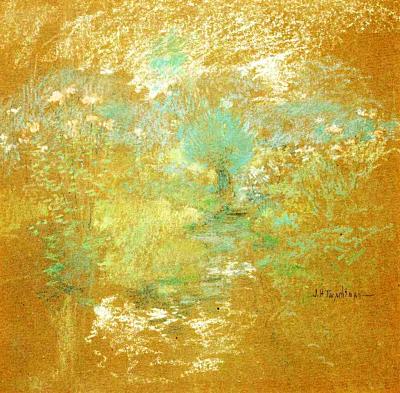
Landscape
John Twachtman
c. 1894-1896
_______________________
Paradoxes of memory
Helmut König
Translation by Nadezda Kinsky
eurozine
Lasting peace agreements after wars and civil wars were for a long time considered to be conditional upon damnatio memoriae – the deliberate and reciprocal forgetting of violence and injustice. However, the established amnesty clause is only realistic where certain rules were not broken during war. The First World War is beyond its scope of applicability, the extermination war of the National Socialists even more so. Where forgetting is impossible, remembering is all that remains. Such remembrance is inextricably and paradoxically linked to forgetting: only what has been remembered can actively be forgotten. _______________________
6 reasons the media hide the true human toll of war
John Tirman
(....)
The Korean war is often called the “forgotten war”; it is not literally forgotten, but avoided. The enormous destruction without a clear and satisfying result for America led rapidly to public indifference. That, I think, is what’s occurred in Iraq—a falsely premised war with enormous devastation leads to a vast carelessness. And the civilians, the real victims, are the most disregarded of all.
(....)
... We simply don’t want to know: it’s too upsetting, too much to absorb. This is not behavior limited to journalists; many academics and NGOs who should know better do the same thing. Because they generally sympathize with the downtrodden of the third world, their indifference is all the more disquieting.
But the major news media enjoy influence that few institutions possess, and with that have a responsibility to be more comprehensive, more energetic, in getting and presenting the full scope of war. Missing the WMD story before the war has been the focus of press criticism. But the bigger failure—the more consequential failure—is neglecting the fate of the people subjected to the U.S. occupation. And once all the American troops are withdrawn, the season of forgetting will be in full flower....(more)
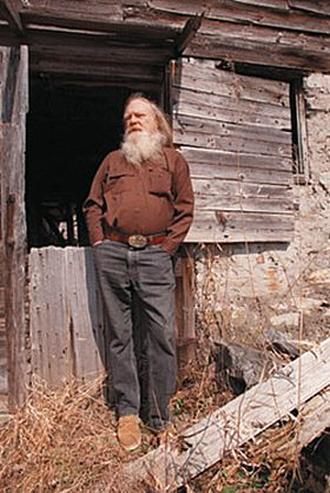
Hayden Carruth
b. August 3, 1921
photo by Al Campanie
The Whole Carruth
A paean to Vermont's state poet in exile
Paula Routly .....................................................
The Way Of The Coventicle Of The Trees
Hayden Carruth
Just yesterday afternoon I heard a man
Say he lived in a house with no windows
The door of which was locked on the outside.
This was at a party in New York, New York.
A deep Oriental type, I said to myself,
One of them indescribable Tebootans who
Habitate on Quaker Heights and drink
Mulled kvass first thing every morning
With their vitamins. An asshole. And
Haven't I more years than he? Haven't
I spent them looking out the window
At the trees? Oh the various trees.
They have looked back at me with their
Homely American faces: the hemlocks
And white birches of one of my transient
Homes, the catalpas and honey locusts
Of another, the sweet gum and bay and
Coffee trees, the hop hornbeam and the
Spindle tree, the dogwood, the great.
Horse chestnut, the overdressed pawpaw
Who is the gamin of that dominion.
Then, behind them, the forest, the sodality.
What pizzazz in their theorizing! How fat
The sentimentibilities of their hosannas!
I have looked at them out the window
So intently and persistently that always
My who-I-am has gone out among them
Where the fluttering ideas beckon. Yes,
We've been best friends these sixty-nine
Years, standing around this hot stove
Of a world, hawking, phewing, guffawing,
My dear ones, who will remember me
For a long, long time when I'm gone.
_______________________

Ladybower Bellmouth
Derbyshire
Serigrapher Bell-Mouth Spillways
1 2
Three Doors to Other Worlds [pdf]
Andrew Crompton
(....)
What we have here is a geometrical oddity: an
edge over which it is impossible to look. Because
you can see the endless walls of the abyss both
below you and facing you, nothing is hidden except
what is down the hole. Standing on the rim, you are
very close to a mystery: a space receiving the light
of the sun into which we cannot see. In no particular
order, let us count some of the ways it can be
described.
(1) It resembles a black hole, a darkness that
is fatal to approach and beyond which nothing can
be known. The diminishing rings of stone speak of
the compression of space as the event horizon is
approached. (2) The curve on the top ring makes a graceful contrast to the steps so that the whole piece is like an architrave framing the abyss,
a sideways portrait of darkness visible.
(....)
_______________________
The Collagist - Dzanc Books
Issue Twenty-Four
July 2011
The Sea Wall
Melody S. Gee
The wall breaks and enters
the sea, who swallows
the barrier fragment
and slips through the hole like an arm
through a dress sleeve, and smoothes
and smoothes the sleeve to sand we stand on.
We die grain by grain.
How else to make salt
houses for all the creatures
who, as we cannot, go down and
down and open their eyes.
Melody S. Gee
_______________________

photo - mw
_______________________
Places: Design Observer
What Does Fiction Know?
Richard Powers
(....)
If I knew, even roughly, how Berlin died, I would lay out the facts in a chain of evidence. And if I had a theory, however tenuous, about the city’s post-mortem life, I would argue it straight up: major premise, minor premise, conclusion. As it is, even the rough arc of exposition, rising action, climax, and denouement feels a bit shaky at best. But I can tell you how it feels, in July, on a sunny day late in the month, at the end of my twelve-week stay in the world’s strangest city.
I’m in Berlin for one reason: to explore how fact and fiction might profitably be collided together. I’ve been in town since early spring, teaching a seminar on that topic at the Freie Universität, with two dozen students from all over Germany who were born knowing more about the topic than I can ever presume to teach them.
(....)
My students have swallowed every bastard hybrid genre I’ve thrown at them. Fictocriticism, mockumentary, staged reality, Borgesian simulated lectures, psycho-journalism, unattributed sampling, hip-hop mashup, real actors playing imaginary authors making pixelated media appearances while selling brutally frank memoirs filled with the slightly altered real-life experiences of some other, dissembling author. My sales pitch has worked so well with this group that, by the end of the semester, I’m appalled at what I’ve unleashed. James Frey, J. T. LeRoy, lonelygirl15, COPS and Survivor and America’s Next Top Model: bring it all on, my German students say. The blurrier the better. They have grown up in a world that laughs at the very distinctions that I’ve come here to challenge, and in class, they regard me with affectionate pity for my quaint belief in the existence of boundaries that a writer might still hope to exploit by transgressing.
The brightest among them sets me straight on the matter: who cares whether you call a thing memoir or fantasy? Relax, Richard. Everything is narrative. The King is dead and it doesn’t really matter what killed the Queen. Anything that life can throw at you gets better if you read it as a pomo novel.
And this spring, Berlin — increasingly pretty Berlin — seems to have reached a similar accommodation. The whole sprawling centerless city has fallen in love with play-acting itself again. Berlin, 2009, seems intent on becoming the based-on-a-true-story version of its all-too-factual past....(more)
_______________________
"When as a child I first experienced myself as a ghostly event in the symbol-free world, I knew that my self would keep me busy for the rest of my life (that I would never finish thinking myself through."
"By evening I had at last - once again - thought myself free: in that moment I raised my head."
-
Peter Handke, The Weight of the World, translated by Ralph Manheim
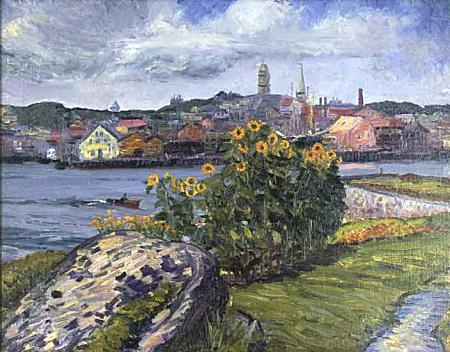
Sunflowers
Rocky Neck
John Sloan
b. August 2, 1871
_______________________
Thirteen poems
Bei Dao
translated by Eliot Weinberger and Iona Man-Cheong
jacket 14
The landscape crossed out with a pen
reappears here
what I am pointing to is not rhetoric
October over the rhetoric
flight seen everywhere
the scout in the black uniform
gets up, takes hold of the world
and microfilms it into a scream
wealth turns into floodwaters
a flash of light expands
into frozen experience
and just as I seem to be a false witness
sitting in the middle of a field
the snow troops remove their disguises
and turn into language
Bei Daob. August 2, 1949 1 2 3 4
_______________________
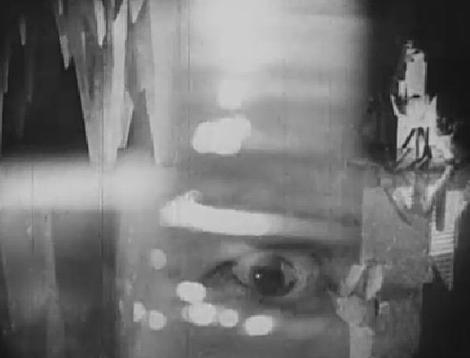
The Seashell and the Clergyman
Germaine Dulac
1928
based on a screenplay by Antonin Artaud
_______________________
Four Scandinavian Poets
Words without Borders
August 2011
1956
Gunnar Harding
Translated from Swedish by Roger Greenwald
So much of this happened
in basements, in thick woolen sweaters, in B major
but with strong passages in minor. On the outskirts.
That’s where we were from
but our thoughts had wings like the pigeons
and like them tried to find urban quarters
where the life of the spirit was more shaded, fluttering
over stone walls heavy with history. The shadow-play of thoughts
exposed what words concealed, that no love is as strong
as the one that goes unrequited. A gentle drizzle
fell over the bike rack. I remember everything
from inside the rain.
...(more)
_______________________
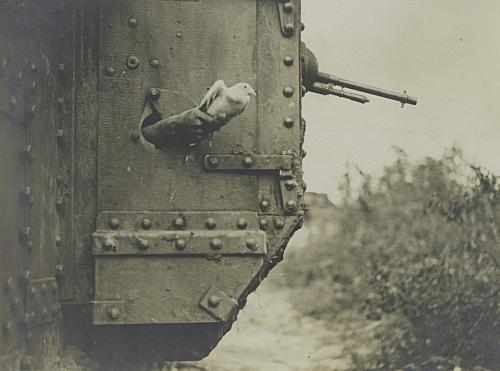
Nationaal Archief
via (OVO)
_______________________
Delivering Newspapers
Bei Dao
translated by Eliot Weinberger and Iona Man-Cheong
Who believes in the mask’s weeping?
who believes in the weeping nation?
the nation has lost its memory
memory goes as far as this morning
the newspaper boy sets out in the morning
all over town the sound of a desolate trumpet
is it your bad omen or mine?
vegetables with fragile nerves
peasants plant their hands in the ground
longing for the gold of a good harvest
politicians sprinkle pepper
on their own tongues
and a stand of birches in the midst of a debate:
whether to sacrifice themselves for art or doors
this public morning
created by a paperboy
revolution sweeps past the corner
he’s fast asleep
_______________________
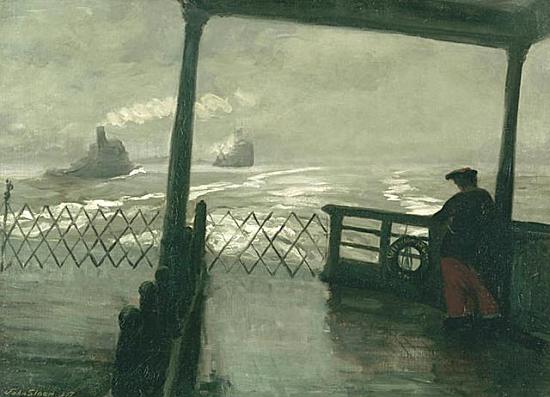
The Wake of the Ferry II
John Sloan
1907
_______________________
"Walking across the city. In the gaps left open by the masses of cars there are still a few isolated individuals, ashen pale or flushed, in incompatible states, and these people have subjected themselves to politics or world history, and amid the technological din they go around posing (like the figures shown in architectural drawings) at the foot of gigantic buildings, which are the essential while they are mere incidentals; moving through this catastrophe as through an underground hangar, I try to breathe everything in through my eyes, to preserve within me the forlorness of these people."
-
Peter Handke, The Weight of the World, translated by Ralph Manheim
_______________________
Banter and Posthumousness
Lars Iyer interview at Cherwell
Literature has a kind of prestige today, it is true, but it is a fading one. The big books of our day are a kind of kitsch, and the pose of authors – serious authors – is laughable. The game’s up! The party’s over! Literature is like an ox-bow lake silting up in the sun. The river of culture has meandered elsewhere. But that’s not to say that there may not be another kind of writing, a post-literature literature, full of black laughter and a sense of its own posthumousness …

photo - mw
_______________________
Aldus
a Journal of Translation
Brown University's Undergraduate Journal of Works in Translation
via NewPages Blog
Antoine Wateau
Marcel Proust
translated by Pat Snidvongs
Now twilight powders cheeks and trees
with her blue mantle and amorphous mask,
the dust of kisses misting weary lips...
what’s dim seems intimate, what’s near, aloof.
That melancholic dream, the masquerade,
makes scenes of love more sad, seductive, false.
A poet’s whim, a lover’s wariness,
love needs to be embellished skillfully--
so here are picnics, silence, music, skiffs.
(....)
One night, I walked along a worn-out road
to Paris, trudging through the countryside;
I was alone, with no one else besides
my sorrow to hold me by the hand.
The face of every field was grave and sad,
in perfect harmony with heaven’s gaze;
no hint of green upon the endless plain
except a park, planted with ancient trees.
I gazed a long time through its gates,
and saw a park recalling Watteau’s art:
green arbour, slender elms, dark yews,
the alleys manicured and groomed.
I left, my soul distressed yet full of bliss;
for as I looked, I understood this truth:
my lifelong dream was within reach,
the prison of my happiness.
_______________________

La Maison aux deux Chemins
Jean Dubuffet
b. July 31, 1901
_______________________
Otoliths 22
“a map of the wheel ruts of modern English”
Raymond Farr
“a”
Dead men structure intrigues
Heartless footless across limitless spans
Tales within tales of the world’s richest coffee bean
Then pilfer
Rivers’ mouths craven with isolates
What then? inquire the dead men
Quantities of process struggle with erasure
Stand up in a meadow
A map
A scale itinerant to looking up
A profit
A loss
An odd light
Looks stellar up in books of stars
“map”
In order to preserve “the way”
The plainer legends distort themselves
As one in a dream arrives at a point
They come to Canal St. & pause
The signs are all here
& of a kind
Previously unremarkable
Stranded six of / marooned five of / abandoned four of
The language they speak
Cranks space out of mambo
...(more)
_______________________

Typist
[from 'Matter and Memory']
Jean Dubuffet
1944
_______________________
A Stroll Through Literature
Roberto Bolańo
translated by Laura Healy
(....)
6. And someone said:
Sister of our ferocious memory,
it’s better not to speak of courage.
He who was able to overcome fear
became brave forever.
Let’s dance, then, while the night goes on
like a gigantic shoebox
atop the cli! and the terrace
in a fold of reality, of possibility,
where kindness isn’t an exception.
Let’s dance on the uncertain reflection
of the Latin American detectives,
a puddle of rain where our faces are reflected
every ten years.
Then came sleep.
(....)
Aldus
a Journal of Translation
_______________________
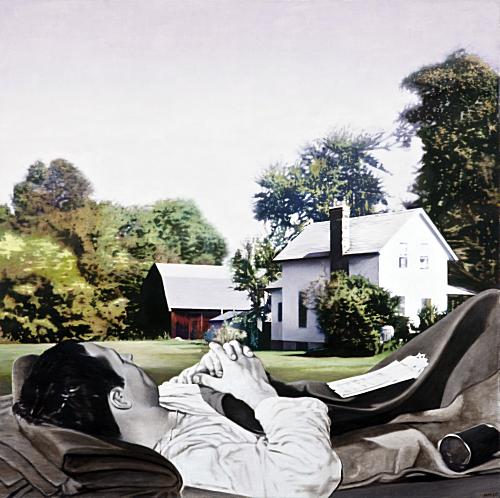
Sanctuary
2010
Martin Mull
Carl Hammer Gallery
via riley dog
_______________________
Words without Borders
August 2011: The Arab Spring, Part II
A Scream Has No Alphabet:
An Interview with Aļcha Arnaout
Translated from French by Cécile Oumhani
The Arab Spring offers a great variety of experiences, new and intense emotions. It is an opportunity for other forms of creation, in unison with the people. In the case of Syria, this has led to innovation. People have composed expressive songs; they have written poems directly inspired by events. Young people, in particular, have made marvelous use of grim humor and a mischievous vocabulary, experimenting with new forms of expression.
I cannot understand how some can remain silent in this turmoil. Even if they choose not to write, at least they should not hide behind an opaque wall, as if they were busy analyzing figures on a page of calculations. This is a historic moment, a moment when speech is golden.
CO: What are you writing at the moment? Can we write a revolt when it is still under way? Does this context lead you to opt for what we call in French “une écriture de l’urgence” (writing as a matter of urgency)?
AA: I write screams, sudden ideas, sentences scattered on dozens of pieces of paper I leave on my desk, sentences beside phone numbers, daily numbers of casualties, notes of all sorts, lists with the names of the people who have been arrested, who have disappeared. I spend most of my time in front of my computer screen, writing e-mails, making and receiving phone calls. I send and receive a huge number of messages every day; I attend meetings and engage myself in activities around them.
I sometimes write as a matter of urgency only to realize the following day that the Syrian people have already gone much further than I have. I find that what I wrote the day before has become ridiculous, obsolete....(more)
_______________________

approaching the upper lock
Merrickville
photo - mw
UbuWeb Top Ten for August 2011
Selected by Anne Hilde Neset
deputy editor The Wire.
_______________________
Nine years of languagehat
Congratulations and many thanks - mw
|
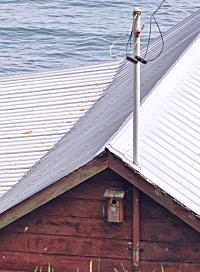
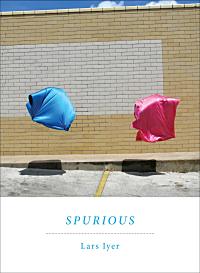


 The Age of Briggs & Stratton
The Age of Briggs & Stratton










































